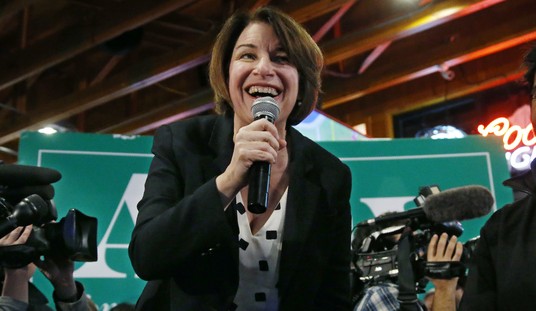The resignation yesterday by National Economic Council Director Gary Cohn indicates President Trump is determined to enact tariffs and ignite trade wars and that Cohn was unable to persuade him otherwise. Last night, Josh Barro pointed out several issues regarding the battle between Republicans and President Trump over tariffs.
As Barro notes, it is Congress, not the president, that the Commerce Clause gives the power “to regulate commerce with foreign nations, and among the several states, and with the Indian tribes.”
Tariffs, which are taxes paid on a particular type of imports or exports, fall under this category. Tariffs ultimately hurt the consumer, because 1) countries often retaliate with their own tariffs targeting American products and 2) higher import costs mean the overall cost of a good is raised because the importer will simply pass the increased cost caused by the tariff to the consumer. (To better understand the effect of tariffs, and economics in general, follow @ScottLincicome, a trade lawyer at Cato Institute.)
CNN Money explains all the legislation that contributed to the transfer of power:
- The Trading with the Enemy Act of 1917 grants the president the power to restrict trade “during time of war”;
- The International Emergency Economic Powers Act of 1977 grants the president the power to use tariffs on another country during a “national emergency”; and
- The Trade Act of 1974 grants the president broad authority to impose tariffs if there is “an adverse impact on national security from imports.”
It is therefore evident the legislative branch has ceded much of its power over tariffs to the executive branch.
But what Congress gives, Congress can, and perhaps should, take away. Congress could pass legislation to return this specific power to itself, which could ultimately serve as Congress’ first step in limiting executive power — a priority frequently touted by conservatives.
For example, Senator Mike Lee (R-UT) has introduced the Global Trade Accountability Act, which will help to rein in presidential tariff powers by requiring all executive branch trade actions to obtain congressional approval, but it is uncertain whether the bill will have enough support to pass.
In the meantime, it seems as though the Republican plan is to first try to persuade Trump to change his mind. Today, 107 House Republicans signed a letter to discourage Trump from imposing certain tariffs, while other Republicans have released public statements:
Despite good intentions, the @POTUS proposed tariffs could put places like Bemis Co. and its 5,000 Wisconsin workers at risk. That’s why I am respectfully asking him to reconsider. pic.twitter.com/zWtRpwcb2V
— Governor Walker (@GovWalker) March 7, 2018
But this is one topic where Trump seems resistant to persuasion.
Because, as Barro reminds us, Trump has long supported the idea of trade wars; while running for the Reform Party presidential nomination in 2000, Trump stated the “World Trade Organization is not necessarily fair to America” and announced his opposition to the North American Free Trade Agreement (NAFTA).
If Trump refuses to back down, and Republicans in Congress choose to restore congressional authority to block the implementation of tariffs, Trump could very well assert that they are undermining him and blocking measures that could help the country. In fact, Press Secretary Sarah Sanders has already responded to criticism by Senator Ben Sasse (R-NE) by claiming Trump was protecting American workers:
.@PressSec Sarah Sanders responded to criticism from Sen. Ben Sasse , who slammed @POTUS' tariff announcement as "a massive tax increase on American families."
TUNE IN: @SenSasse joins @BretBaier tonight at 6p ET on Fox News Channel #SpecialReport https://t.co/QAIXo1HTMy pic.twitter.com/Zncmnjw3al
— Fox News (@FoxNews) March 1, 2018
Further complicating matters is that the Republicans are in a precarious position when it comes to public opinion on free trade. Though the Republican Party has long been considered the party of free trade, 61% of Republicans in 2016 thought free-trade agreements hurt the country, and support among Republicans for free trade last year was worse than in May 2015.
So, as Barro points out, Republicans may be in a lose-lose situation if they can’t convince Trump to back down. If they oppose tariffs, then they find themselves in opposition to the president as well, and it’s possible their constituents back home will not agree with their opposition to either. Many Republicans are up for reelection this year, and Trump is sure to retaliate against what he perceives to be disloyalty.
And all of this comes at the worst possible time. In the run-up to the 2018 midterm elections, Republicans have been gaining in congressional ballot polls as a result of the tax legislation that becomes increasingly popular each day. It’s quite possible these tariffs could set off a chain reaction with increased costs and decreased job growth that negates much or all of the benefits gained from the tax legislation.
So, because Congress ceded power to the executive, the president’s failure to understand the full ramifications of his policy preferences and his insistence on tariffs could now initiate a trade war, stunt economic growth, and hurt Republicans.
Unfortunately, the window for persuading Trump is closing or may have already closed. Earlier today, a White House official revealed that Trump will make the steel and aluminum tariffs official in a signing event tomorrow afternoon.
Trump will make the steel and aluminum tariffs OFFICIAL in a signing event Thursday at 3:30 p.m., White House official says.
— Jennifer Jacobs (@JenniferJJacobs) March 7, 2018
The views expressed here are those of the author and do not represent those of any other individual or entity. Follow Sarah on Twitter: @sarahmquinlan.














Join the conversation as a VIP Member